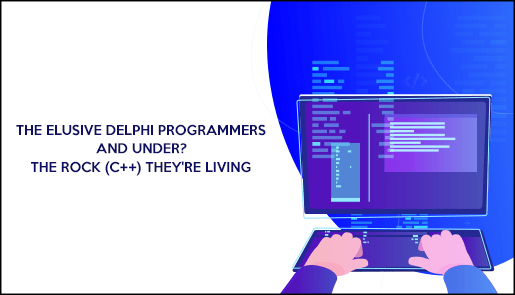The Elusive Delphi Programmers And The Rock (C++) They’re Living
A programming language is a sort of composed language that instructs computers to work. A programming language is utilized to make all the computer projects and computer programming. A programming language resembles an arrangement of guidelines that the computer takes after to accomplish something.
A software engineer composes source code message in the programming language to make programs. More often than not, the programming language utilizes genuine words for a portion of the orders, with the goal that the language is less demanding for a human to peruse. Many programming language s utilize accentuation simply like an ordinary language. Numerous projects currently are “assembled”. This implies the computer makes an interpretation of the source code into another language, (for example, low-level computing construct or machine language ), which is significantly speedier and less demanding for the computer to peruse, however considerably harder for a man to peruse.
Computer programs must be composed painstakingly in the event that the software engineer commits errors, or the program endeavors to accomplish something the developer did not outline it to do, the program may then “crash” or quit working. At the point when a program has an issue due to how the code was composed, this is known as a “bug”. A little misstep can cause a major issue.
Kinds of Programming Languages
There are numerous kinds of programming language s. Most programming language s don’t tail one compose alone, so it is hard to allow a sort for every language. The cases of each sort are given in each segment beneath in light of the fact that they are the best surely understood cases of that compose.
High Level Versus Low-level
Abnormal state programming language s require less information about the equipment contrasted with low-level programming language s. Abnormal state programming language s require a mediator to change over into low-level programming languages.
Explanatory versus Basic Programming
Decisive programming language s portray an “issue” however they more often than not don’t state how the issue ought to be tackled. The issue portrayal utilizes rationale, “comprehending” the issue regularly looks like naturally demonstrating an arrangement of sensible maxims. Cases for such programming language s are Prolog, XSLT, LISP, and SQL.
Basic programming language s portray an arrangement of state changes. Toward begin, the program is in a specific state, and the COMPUTER is offered ventures to take after, to play out an activity. Following the means makes the program “change state”.
As a rule, definitive programming language s are more secure and shorter. Basic programming language s are more typical, in light of the fact that they are less demanding to utilize.
Practical versus Procedural
Practical programming takes a gander at programming like a capacity in arithmetic. The program gets input, some data, and utilization this data to make yield. It won’t have a state in the middle of, and it will likewise not change things that are not identified with the calculation.
Procedural projects are an arrangement of steps or state changes.
Stack Based
Stack-based language s take a gander at a portion of the program’s memory like a pile of cards. There are not very many things that should be possible with a stack. An information thing can be put on the highest point of the stack. This task is for the most part called “push”. An information thing can be expelled from the highest point of the stack. This is known as a “pop”. You can take a gander at the thing at the highest point of the stack without evacuating it. This is known as a “look”.
In the event that a program is composed as “push 5; push 3; include; pop;” it will put 5 on the highest point of the stack, put 3 over the 5, including the main two qualities (3 + 5 = 8), supplant the 3 and 5 with the 8, and print the best (8). Cases for programming language s that are stack-based are the language s Postscript and Forth.
Question Situated
Question situated programming language s put information and capacities that change information into a solitary unit. This unit is called a “protest”. Articles can collaborate with each other and change another question’s information. This is normally called epitome or data stowing away. Most current programming language s are question arranged. Cases of this are Java, C++, C#, and other C language s.
Stream situated
Stream situated programming considers programming to be interfacing distinctive parts. These parts send messages forward and backward. A solitary segment can be a piece of various “projects”, without should be changed inside.
Each programming language has run about what it can and cannot do. These include:
- Correct numbers (kinds of numbers, and how expansive or little the numbers can go)
- Words (held words, case-affectability)
- Limits on what the programming language can do
Most language s have official norms that characterize the principles of how to compose the source code. Some programming language s have at least two guidelines. This can happen when another standard replaces an old one. For instance, the Perl 5 standard supplanted Perl 4 out of 1993. It can happen on the grounds that two individuals made two guidelines in the meantime. For instance, there are a few principles for APL.
Protest Oriented Programming (now and then abbreviated to OOP) is a type of programming where all parts of the program are objects. Articles are bits of memory with a similar structure that can be utilized over and over. A ledger, bitmap, or legend from a computer game could all be protests inside a program. Articles are comprised of properties (snippets of data the question stores) and strategies which are things the protest can do. Dog protest may have properties like stature and hair color. Its strategies may incorporate bark() and wagtail().
All items are made from formats called classes. You can think about a class as a form from which objects are made. The class characterizes every one of the properties and techniques that its articles will have. Items made from a class are called examples of the class. A class can expand another class, which implies that it takes every one of the properties and strategies for the class, however, can include its own.
There are times we do some unremarkable undertaking, and we are abruptly overwhelmed with a reminiscent feeling of misfortune and a memory we can’t exactly put a name to. We wind up asking our colleague hello, whatever happened to so this and you both attempt to invoke the points of interest of some pattern that vanished appropriate from under your noses. This is somewhat how the coding scene feels about Delphi. A speedy Quora look restores a lot of inquiries like the one above, people born after WW2 pondering where Delphi strayed to what was that progressive RAD instrument from the late 90’s called, once more?
How about we return to 1995. Borland Software Corporation just discharged their Turbo Pascal successor, Delphi, an incorporated advancement condition utilizing its own vernacular of Object Pascal to encourage Windows, MacOS, iOS, Android, and Linux applications, and the whole everybody is anxious to take an interest. Contrasted with IDEs that preceded it, Delphi exhibited unparalleled database bolster, constructing a multidimensional domain for software engineers to compose code speedier and with less blunders than at any other time. Delphi spoke to a one-stop-look for fast application improvement including a code proofreader, the visual creator that bolstered cross-stage advancement, a coordinated debugger, source code control component, and outsider module bolster. The code editorial manager offered engineers blunder knowledge and refactoring, helping them segregate and redress mistakes without beginning again.
Advantages of Delphi Programming:
- Clear language structure, making code amazingly lucid
- Drag and drop component for GUI execution, enabling you to fabricate GUI programming rapidly
- Support for SQL databases
- Supports whole Windows API
- Full-question arranged to the programme
- Interoperable with C++’
- Highly versatile VCL system
That last shot conveys us to our next point, C++. Clearly, Delphi spoke to the market in light of the fact that the market was requesting a quality tool stash for Windows-based work area application improvement. What’s more, for this, Delphi conveyed. It was quick and it was genuinely instinctive, arranging lines a rate that was comparatively radical. Before long the improvement world dismissed its consideration from Window-based applications as we wound up engrossed by powerful web application procedures that picked up energy amid the mid-2000’s paralleling the ascent of .NET and Java.
Borland couldn’t keep pace with the excited improvement atmosphere and surrendered Delphi to Embarcadero advances in 2008. Despite the fact that, Borland might be dead, Delphi absolutely is With Embarcadero, Delphi has endeavored to stay important to the application scene, experiencing thorough developments to furnish its client base with present-day highlights. Since 2016, Delphi has issued a refresh at regular intervals. Delphi as a free situation is to some degree an obsolescence, on the grounds that there are better programming biological systems, a genuinely undisputable actuality. Be that as it may, Delphi has a kind of advantageous association with C++.
RAD Studio 10, Embarcadero’s most recent discharge publicized Delphi 10 and C++ Builder 10, and in spite of the fact that the Delphi IDE without anyone else’s input is dated, the language and API remain refreshed and gainful. For designers as yet working heritage code, Delphi is the most evident decision since it requires low support, so Embarcadero has kept up an extremely solid buyer following involved long-term clients. Considering long-lasting clients are the essential purchasers, there is a developing misguided judgment that Delphi has vanished for good or that it’s covering up under a stone someplace prompting reminiscent discussions about its superb past.
Embarcadero keeps on discharging Delphi refreshes, and for the individuals who still use Delphi, the movements can be testing. For those looking to at last move far from Delphi, the relocations can be significantly more difficult. Very few new software engineers can guarantee the reasonability of an organization’s Delphi framework, or help relocate to its more up to date forms while saving information trustworthiness. Anyway, affirm, where are the slippery Delphi software engineers stowing away?






